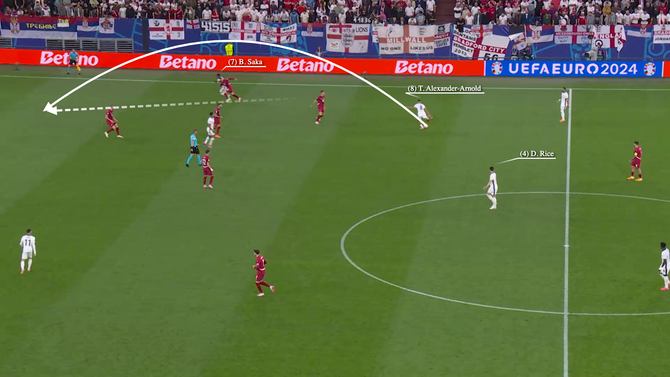
After two largely underwhelming displays, the latter of which ended with an ominous ejection nine minutes into the second half, it is perhaps worth remembering why England needed a midfielder like Trent Alexander-Arnold in the first place. Three straight tournaments had ended with the English public wondering what might have been if they'd only been able to wrestle control of the midfield from Luka Modric, Jorginho and Aurelien Tchouameni.
Like manna from heaven, here came Alexander-Arnold. As a right back, Liverpool's No. 66 was more of a wide playmaker, whose greatest strengths were in the final third. He had been an awkward fit for a conservative England side. Then as the 2022-23 season wore on, Jurgen Klopp started inverting his full back more, getting Alexander-Arnold into midfield spots where he could influence play as a deep-lying playmaker. If that was where he was ending up for his club side, why not start him there for his country? What greater upgrade could there be to England's control of games then taking a role previously fulfilled by Jordan Henderson and Kalvin Phillips and handing it to one of the best passers in the sport?
So far that upgrade is, at best, only apparent in patches. Ironically, Alexander-Arnold's best action of the morose 1-1 draw with Denmark came just before Conor Gallagher replaced him, a customarily searing pass over the top that caught Kasper Schmeichel in no man's land and which Bukayo Saka did well to hook into the side netting. No one in the tournament so far is averaging more accurate long balls per 90 than England's No. 8. In his 54 minutes on the pitch, Alexander-Arnold created more chances and made more line-breaking passes than anyone else.
England's misfunctions weren't his alone and his departure hardly presaged an immediate upswing in form. That the Three Lions were so underwhelming is perhaps more down to the fact that their spine -- Harry Kane, Declan Rice and John Stones in particular -- largely looked off-color. The reason that Alexander-Arnold catches the eye is that he promised to be England's ceiling raiser, the man whose guile in the heart of the pitch could take England from tournament contenders into winners. That has not yet transpired.
Perhaps that is simply because it is too late in the day to be teaching Alexander-Arnold how to be a true midfielder, not a right back popping infield as and when required.
"When you play center midfield, it's like muscle memory," says CBS Sports analyst Nigel Reo-Coker, a veteran of seven years of engine room duels in the Premier League. "You're very aware of danger, when to press, when not to. Your body shape is something you need to understand, your positioning too.
Don't miss CBS Sports Golazo Network's Morning Footy, now in podcast form! Our crew brings you all the news, views, highlights and laughs you need to follow the Beautiful Game in every corner of the globe, every Monday-Friday all year long.
"When you look at Trent with Rice, the distances sometimes are too tight. He doesn't know when to drop and shield the attacking player, today Christian Eriksen and Rasmus Hojlund. When England do have possession he's too square, too in line with Rice. It allows a simple ball between the two of them, between the lines. Whoever you're playing against will break freely and through you. If he's there to offer more crosses, he needs to be higher up the pitch.
"You can't learn these things overnight. The more you play central midfield, the more you see the danger and understand how your positioning affects the opposition. It didn't work tactically and at times in the game, with Jude Bellingham being free as well, you could put a blanket over Rice, Alexander-Arnold, Saka and even Saka and Kane. They're so tight and narrow in the middle of the pitch. A natural central midfielder would know they can dominate that area and dictate where players can be. They were too flat, too square."
Perhaps much of this could have been resolved, or at least mitigated, if Alexander-Arnold had had more reps in the England engine room. Southgate has intimated an interest in moving the Liverpool man infield for some time but injuries have meant that the only teams to line up against a Three Lions midfield including Alexander-Arnold before this tournament were Andorra, Malta, North Macedonia and Bosnia. Those are hardly the sort of teams that can give anyone a sense of how the "experiment" will work at the business end of a major tournament, particularly when the subject is not playing alongside Rice and Bellingham.
In flashes, there are signs of something that might work. One of England's best moments in their opening win over Serbia came when Alexander-Arnold had moved into a pocket of space, offering that angle from Rice such that any pass on the pitch might have been available to him. He picked the right one, a gorgeous ball lofted over the top for Saka to chase down.

Sitting in the inside right channel, advanced from Rice, positioning himself in a spot not too dissimilar to that from which Kevin De Bruyne wreaks havoc in a Manchester City shirt, Alexander-Arnold looked primed to deliver a string of precise crosses into the danger area. Was that the best use of his qualities, rather than getting the ball off the England center backs to advance his side up the pitch? Southgate tried some of that approach early on against Denmark but evidently whatever he was trying was not working.
Perhaps the manager himself does not really know exactly what it is he wants from Alexander-Arnold. His post-match comments would suggest as much.
"He's had some moments where he's delivered what we thought he would," said Southgate. "We know it's an experiment. We know we don't have a natural replacement for Kalvin Philips. We're trying different things and at the moment we're not flowing as we'd like."
Whatever Alexander-Arnold is, he's not a natural replacement for Philips, a mobile destroyer rather than the tempo setter England have been crying out for (while occasionally ignoring the qualities of Michael Carricks and Owen Hargreaveses) throughout their recent international history. It's not entirely clear that that's what Alexander-Arnold is anyway, not when he is only attempting 43 passes against Serbia.
Then again, what else is there? Twice Southgate has turned to Conor Gallagher, a natural midfielder but one whose best performances tend to come in a more off-ball role. Kobbie Mainoo likes to have the ball at his feet but the great quality of his fledgling career seems to be carrying the ball away from pressure that does not always come in the international game. Adam Wharton might offer something England need in possession but even Southgate's most virulent critics might eventually concede that six months of Premier League football is not a lot to go on.
Amid all the tumult, England are where they need to be, top of their group and almost certainly bound for the knockout stages. Reasonably successful tournament runs from this team under this management have included disappointing draws against weaker opposition, particularly Scotland and the USA. On those occasions, however, the sense was of a settled vehicle that just needed a bit of tuning, not one who still hadn't worked out what engine would get it going. The time for experimenting will soon be over and Southgate might not yet have enough information to know whether Alexander-Arnold can be what England need to win Euro 2024.
















